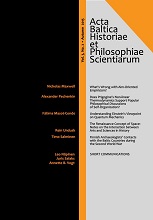The Premises and Limits of Science: The Ideas of Rein Vihalemm
The Premises and Limits of Science: The Ideas of Rein Vihalemm
Author(s): Leo NäpinenSubject(s): Philosophy of Science
Published by: Tallinna Tehnikaülikooli õiguse instituut
Keywords: Rein Vihalemm;
Summary/Abstract: This short paper discusses how the philosophical understanding of science as φ-science (phi-science) by Rein Vihalemm reveals the limits of science (both the classical and non-classical) in describing the reality as grasped by laws, that is, in a predictive and logically explanatory way. Or, in other words, the limits begin from the phenomena of reality which are unpredictable, unstable, nonrecurrent, accidental and so on. All these features Rein Vihalemm sees as the characteristics of the “given” natural objects, which can be seen through the social-historical practice, they are not the ‘things in itself ’, but emerge through practice as the ‘things for us’. This understanding is in accordance with Rein Vihalemm’s ‘practical realist philosophy of science’ and, as it seems, also with Nicholas Maxwell’s conception of ‘aim-oriented rationality’. Both Vihalemm and Maxwell have stressed that there is one real world and potentially an infinite number of real ‘world-versions’ about this one real world. All these real ‘worldversions’ can be achieved only through the social-historical practice.
Journal: Acta Baltica Historiae et Philosophiae Scientiarum
- Issue Year: 3/2015
- Issue No: 2
- Page Range: 108-114
- Page Count: 7
- Language: English

